These are the anti-heroines we’ve been waiting for
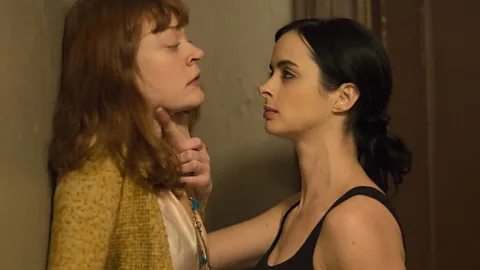 Netflix
NetflixWhy hasn’t there been a female version of the TV anti-hero? Perhaps, with UnReal, Veep and Jessica Jones, that's changing, writes Jennifer Keishin Armstrong.
From the very first scene of UnReal’s second-season premiere, we know what kind of main character we’re dealing with. Shiri Appleby’s Rachel, a TV producer, gets a new tattoo on her inner wrist listing her priorities: “Money. Power.” And a third we can’t print referring to her male-objectifying lust.
Throughout the episode, she checks them off: she gets a promotion – she’ll now run the Bachelor-style reality programme Everlasting, where she’s been honing her stellar manipulation skills as a lower-level producer for the past several years. At a party celebrating her female boss and mentor’s new “seven-figure” production deal in Vegas, Rachel snorts cocaine and sleeps with the latest Everlasting star’s manager. Then she talks a junior producer through her first exploitative on-camera interview, directing her to bring a contestant to tears over her fiancé’s recent death. The junior producer vomits afterward, then chokes, and gasps “That was amazing!”
This isn’t just a show about an anti-heroine. It’s a show about the making of more anti-heroines – and what a heady trip being bad can be.
UnReal proves that the anti-heroine is finally, unequivocally, here. We have been living in the era of the TV anti-hero – to the point of oversaturation – since Tony Soprano strode onto the scene 17 years ago with a complicated family life and a gun in his pocket. Walter White, Don Draper and many others followed. But we saw few women with the same privilege of being bad while staying in viewers’ good graces. Now, at last, with UnReal’s Rachel – as well as, arguably, The Good Wife’s Alicia Florrick, the title character of Jessica Jones, Veep’s Selina Meyer, and most of the women of Orange Is the New Black, among others – we have entered the era of the anti-heroine.
 Lifetime
LifetimeIf you’re wondering why this is important, think about how the men I mentioned above – Tony Soprano, Walter White, Don Draper – make men feel. We like our characters at extremes. We’re not likely to take on any of those men’s lifestyles wholesale, but bringing a little Tony Soprano to your ing job, or a little Don Draper to your first Tinder date, feels good. Seeing people like ourselves on TV with the entire spectrum of human traits – from very bad to very good – is empowering. It makes for better stories, and better roles for the stars.
Naturally, that means women have been left behind in the anti-hero trend. That’s partly because grounding stories in even a hint of realism favours the anti-hero, at least when you’re looking at the obvious ‘bad guys’: men have always been more likely to be crime bosses than women. They were obviously more likely to be cheating, promiscuous ad agency executives of the 1950s; that blatant sexism is, after all, one of the main points of Mad Men. But history shows that it’s harder for unlikeable female characters to even network approval, much less gain the affection of the general public. Walter White’s wife couldn’t catch a break with viewers, even though she was married to an anti-hero, and thus deserved our sympathy far more than our ire.
Bad to the bone
Throughout film and television history, women have sometimes been allowed to serve as pure villains or femmes fatales. But elevate that flawed woman to main-character status, and she has a much tougher time.
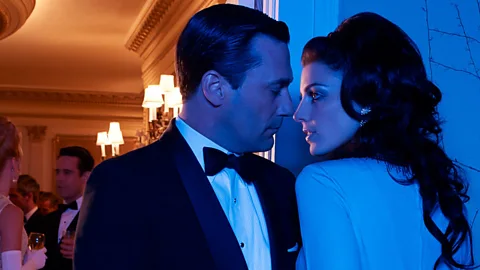 AMC
AMCThe modern TV anti-heroine likely began with Sex and the City’s Carrie Bradshaw. Interestingly, she debuted six months before Tony Soprano on the same network, HBO, which launched the current ‘golden age of drama’ by making gritty series with strong artistic visions and often aggressively unlikeable characters – Carrie included, though she rarely gets the same credit as Tony.
Of course, anything she did that was bad was several levels below murder: her worst crime was cheating on a very nice boyfriend, Aidan, with a married ex, Big. But she gets short shrift in TV history because of what a phenomenon Sex and the City became, complete with every traditionally girly accoutrement possible – designer shoes, purses, pink cupcakes, pink drinks, girl talk over expensive brunch. Carrie’s otherwise transgressive achievement was adorned with, and drowned in, stereotypes.
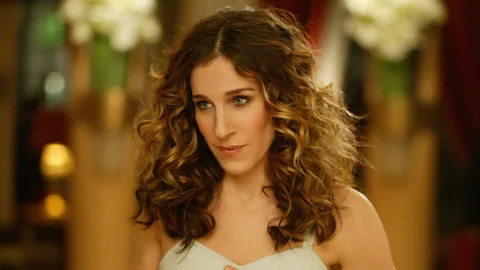 HBO
HBOCarrie did, however, break down a barrier that would allow her successors to go much further. Shonda Rhimes, who has almost single-handedly integrated and complicated female-driven broadcast drama, started with Meredith Grey of Grey’s Anatomy, who’s essentially a medical doctor version of Carrie Bradshaw. Our first introduction to Meredith was seeing her run out on a drunken one-night stand without exchanging names. Later she found out he just so happened to be her boss at her new job. Meredith has never made a play for sympathy since, instead leaning into her “dark and twisty” tendencies; she slowly earned our affection with time.
Rhimes’s more recent leading ladies have treaded into Soprano territory: How to Get Away With Murder is not kidding with its title, and its main character, Annalise Keating (Viola Davis) is unapologetically the cause of a shocking number of dead bodies. And Scandal, starring Kerry Washington as DC strategist Olivia Pope, stands as Rhimes’s clearest morality play yet. This past season, its fifth, has made it clear that the show is, for all its soapy dramatics, the story of how an anti-heroine is made, how she goes from wearing the white hat to committing murder. The fact that these last two shows are led by women of colour is even more extraordinary. But they’re such finely drawn characters, played by such great actresses, that they’re working on a Tony Soprano level. Viewers love them despite their crimes.
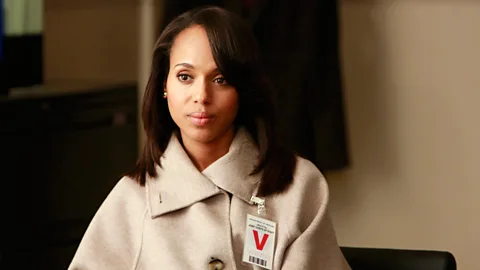 ABC
ABCLena Dunham and her Girls characters somehow don’t fare as well with viewers, even though they haven’t physically harmed a soul. The show’s very first promo posters in 2012 had the tagline, “Living the Dream. One mistake at a time.” In other words, the whole point of the show is to follow young women through the time in their lives when many of us are far from our best, their early 20s.
And yet only perhaps Hillary Clinton has felt as much public ire as Dunham. Perhaps it’s her sense of entitlement that has grated on people so much. (In the very first episode, she responds to her parents cutting her off financially by snapping, “This is nuts. I could be a drug addict. Do you realise how lucky you are?”) What it’s taken viewers a while to realise is that Dunham isn’t condoning the behaviour of her character, Hannah Horvath, nor that of her friends. She is, if anything, making fun of it; she’s giving us a comedy of manners for the 2010s, full of young adults lacking self-awareness who will likely cringe at their own behaviour in hindsight. We’re not supposed to like them; we’re supposed to cringe, even as we relate to them.
Purposefully poisonous
Herein lies the key to any effective anti-hero, male or female: they serve a purpose. They’re more interesting to watch than a traditionally likeable character because they have somewhere to go and something to do. They might hold up a mirror to our society’s own worst traits, the way Seinfeld and The Sopranos both ultimately held their audiences able for cheering the characters on. They might offer a story of redemption (Don Draper looked like he was headed there, but stopped short) or comeuppance (like Walter White’s). UnReal shows us the depths to which a woman must stoop to give us what we often see as harmless, brainless entertainment like The Bachelor. The Good Wife and Scandal demonstrate the corrosive effects of politics on even well-meaning souls. Veep shows us the absurd inhumanity of political office, and what kind of person it takes to endure that.
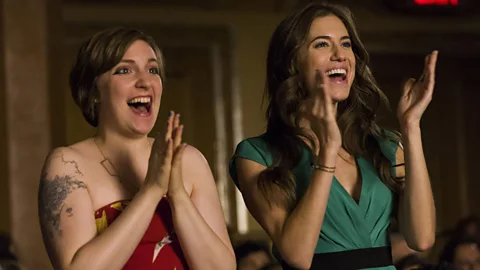 HBO
HBOAnd some of the best of our anti-heroines also trace their fatal flaws back to their struggles with, specifically, womanhood. An anti-heroine doesn’t have to be a crime boss or a powerful executive (though she could be). UnReal’s Rachel draws her power from exploiting other women, making a show for women. The Good Wife’s Alicia cheated, lied, and shut down emotionally to avoid the pain she’d experienced with her politician husband’s public betrayal. Jessica Jones became an uncaring, alcoholic badass – and a superhero – in reaction to being sexually and emotionally assaulted by a mind-controlling man. These are the stories in which women find their power. These are the anti-heroines we’ve been waiting for.
If you would like to comment on this story or anything else you have seen on BBC Culture, head over to our Facebook page or message us on Twitter.
And if you liked this story, sign up for the weekly bbc.com features newsletter, called “If You Only Read 6 Things This Week”. A handpicked selection of stories from BBC Future, Earth, Culture, Capital, Travel and Autos, delivered to your inbox every Friday.
